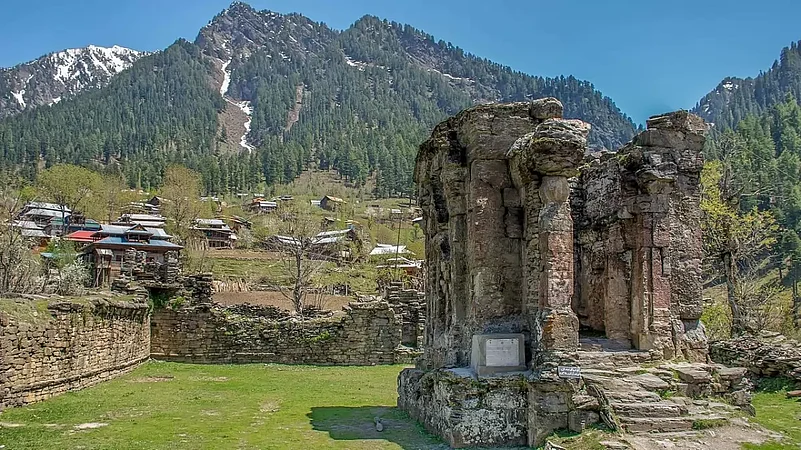Ravinder Pandita’s demeanour seems confident. And it is only after his ‘Mission Sharada’ has found some firmness after years of his toil.
On Wednesday, Union Home Minister Amit Shah will virtually inaugurate a temple and a Dharamshala at a small border village—Teetwal along the Line of Control in north Kashmir’s Kupwara district. The village along the bank of the marvellous Kishenganga river will witness some buzz for the day.
Shah’s inauguration of the temple and the Dharamshala at Teetwal is part of Pandita’s “mission” for the revival of pilgrimage to Sharada Peeth, the ancient Hindu University which at present lies across the LoC. Pandita has been vociferously demanding the revival of the Sharada pilgrimage under his Save Sharada Committee.
“It is a mission for reopening of the Sarwagania Peeth in Pakistan-occupied Kashmir in Neelam ghati. This is a base camp (at Teetwal), which was burnt in 1947 during tribal raids. Both the Gurudwara and the mandir were burnt down. We have rebuilt it and are inaugurating it tomorrow,” said Pandita while speaking to Outlook.
Sharada Peeth
The temple, revered by Kashmiri Pandits, has been out of bounds for Indian pilgrims since 1947.
The Sharada temple or Sharda University in Neelam Valley is 160 kilometres from Muzaffarabad across the LOC.
The remnants of the significance of Sharda lie in a village known as Shardi or Sardi, where the river Neelam (Kishanganga) converges with the Madhumati and Sargun streams.
Professor Ayaz Rasool Nazki, a scholar and former regional director of the J&K chapter of the Indian Council for Cultural Relations, who was the first Kashmiri to visit Sharada across LoC in 2007 recalls his tryst at the spot.
It was after Nazki’s visit in 2007 to Sharada that the demand for allowing pilgrims to the temple from the Indian side gained momentum.
“It was a sweet sign to find the structure lying intact at Sharda. I was visiting the place after it was closed down for nearly 80 years. Its complex is vast. Its structure has got wear and tear naturally only. Its wood roof was damaged. I found all the lawns of it maintained and manicured,” said Nazki.
Besides, it was heartening for Nazki to find the locals, all talking with reverence about the site. “They (locals) would refer to the site as Sharada Maie or Sharada University,” said Nazki.
He also said that he found the site’s complex had not been encroached upon, despite the local government allocating it to some locals across LOC.
The temple was also once regarded as the foremost centre of higher learning in the Indian subcontinent. It is also one of the 18 Maha Shakti Peethas, or a “Grand Shakti Peethas” and is considered to be the abode of the Hindu Goddess Saraswati.
Nazki said Sharada Peeth is a kind of “darohar” or treasure for Kashmiris since it has got two aspects of faith and rich history attached to it.
“Sharda had been a seat of learning. Irrespective of religion, it was perhaps our first seat of learning. At one point in time Sharada University had 5000 resident scholars who came from all over the world in ancient times,” said Professor Nazki.
Besides, he said its library was massive in ancient times. “If any manuscripts weren’t found anywhere in the world, the scholars' quest for it would end at only Sharada,” Nazki added.
During those ancient times, Nazki said subjects including science, philosophy, and religion were taught at Sharada.
As per the legend, the goddess Sharada saved the pot of knowledge during a war between evil and good. She carried it to the Neelam Valley and hid it beneath the ground. She then turned herself into stone to cover it and thus there are only rectangular stones covering the floor of the temple.
It is also said, that the famous conversation between Abhinav Gupt and Adi Shankaracharya took place at the temple, who had travelled all the way from the summer plains of the south to the Himalayas in the north to quench his thirst for knowledge.
Sharada Peeth or the Seat of Sharada, named after the goddess of wisdom Saraswati, is believed to be an ancient centre of learning established in Neelum Valley in 273 BC, even before the Takshila and Nalanda universities.
While the university has always been a centre of attraction, the annual pilgrimage to the temple flourished during the reign of Maharaja Pratap Singh and Ranbir Singh.
The pilgrimage came to a halt after the Partition in 1947 and the university and temple have since fallen into disrepair. While India and Pakistan opened up cross-LoC movement for people on either side of the border, travel was restricted to the families that had been divided.
A few years ago, Nazki said he had proposed the government set up a composite University at Sharda from both parts of divided Kashmir across LoC to make the ancient learning seat once again a vibrant spot of knowledge.
He now hopes both India and Pakistan put politics on the back burner to let the flame of knowledge glow at Sharda.
Land for Sharda base camp at Teetwal donated by local Muslims:
It was in 2021 that “bhumi pujan” was done at Teetwal for the inauguration of the base camp.
Pandita is all praise for his Muslim brethren who donated land for the temple at Teetwal.
He also said the site of the temple assumes significance since it is one of the traditional routes for the Sharda Peeth pilgrimage.
“This is the official route and we have reclaimed our lost heritage which was burnt in 1947. We are fighting for the reopening of Sharda Peeth. It is a clear signal to Pakistan that we are near it and on the lines of Kartarpur, we urge both the governments of India and Pakistan to make amendments in LoC permit rules to allow cross-the lost cultural heritage tourism,” said Pandita.
Former Jammu and Kashmir Mehbooba Mufti had also demanded starting of the Sharada pilgrimage on the lines of Kartarpur Sahib in 2018.


























